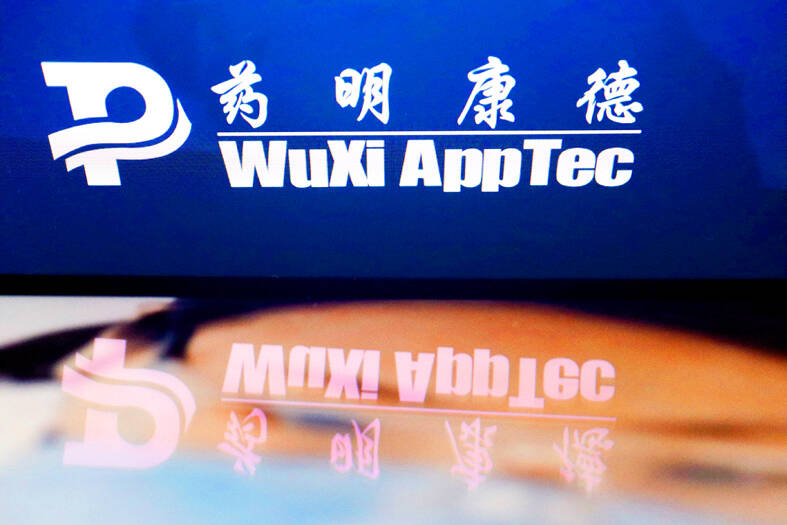The US should review Chinese biotech firm WuXi AppTec (藥明康德) and its affiliate WuXi Biologics (Cayman) Inc (藥明生物) for sanctions, a bipartisan group of lawmakers told top officials of the US President Joe Biden’s administration on Monday.
In a letter dated Monday and seen by Reuters, the lawmakers told US Treasury Secretary Janet Yellen, Defense Secretary Lloyd Austin and Commerce Secretary Gina Raimondo that the global pharmaceutical giant’s links to Chinese Communist Party (CCP) and military threatened US national security.
The letter, signed by the Republican chair and Democratic ranking member of the House Select Committee on China, Representatives Mike Gallagher and Raja Krishnamoorthi, and Senators Gary Peters and Bill Hagerty, is Congress’ latest effort to highlight what it says are risks posed by China’s biotech leaders.

Photo: Reuters
Congress has introduced legislation that would restrict federally-funded medical providers from allowing China’s BGI Group (華大集團), WuXi AppTec and other biotech firms from getting genetic information about Americans.
WuXi AppTec did not respond immediately to a request for comment, but has repeatedly said that it is not a national security risk to any country.
“We are concerned by a misguided US legislative initiative to target our company without a fair and transparent review of the facts,” WuXi AppTec said previously in a statement still on its Web site home page.
The four lawmakers — citing public Chinese government documents, Chinese university Web sites and media articles — outlined what they called WuXi AppTec’s clear military ties, as well as support for China’s policies in Xinjiang, a region where Washington has accused Beijing of committing genocide against Muslim minorities.
They said WuXi AppTec had received investment from numerous Chinese People’s Liberation Army (PLA) funds, including the AVIC Military-Civil Integration Selected Hybrid Securities Investment Fund.
They also cited a resume for WuXi Biologics CEO Chen Zhisheng (陳智勝), posted in 2018 to a Tsinghua University Web site, that listed him as a visiting professor at China’s Academy of Military Medical Sciences, which was added to the US Department of Commerce’s export control list in 2021.
“Given WuXi AppTec’s clear ties to the CCP and the PLA and its likely role in enabling the genocide in Xinjiang, we urge your departments to consider the inclusion of WuXi AppTec and its subsidiaries on your respective control lists,” they said in the letter.
Those should include sanctions under Treasury’s Non-SDN Chinese Military-Industrial Complex Companies List, the Commerce list restricting US sales to named entities and the Pentagon’s “1260H” list, which carries implicit warnings about US cooperation with certain firms.
“WuXi AppTec and WuXi Biologics have obscured their ties to the CCP and PLA and, as a result, are rapidly integrating themselves into US supply chains by signing agreements with prominent US biotech entities,” the lawmakers wrote.
The two companies have counted Pfizer Inc, AstraZeneca PLC, GlaxoSmithKline PLC and US national labs as partners.

SEEKING CLARITY: Washington should not adopt measures that create uncertainties for ‘existing semiconductor investments,’ TSMC said referring to its US$165 billion in the US Taiwan Semiconductor Manufacturing Co (TSMC, 台積電) told the US that any future tariffs on Taiwanese semiconductors could reduce demand for chips and derail its pledge to increase its investment in Arizona. “New import restrictions could jeopardize current US leadership in the competitive technology industry and create uncertainties for many committed semiconductor capital projects in the US, including TSMC Arizona’s significant investment plan in Phoenix,” the chipmaker wrote in a letter to the US Department of Commerce. TSMC issued the warning in response to a solicitation for comments by the department on a possible tariff on semiconductor imports by US President Donald Trump’s

The government has launched a three-pronged strategy to attract local and international talent, aiming to position Taiwan as a new global hub following Nvidia Corp’s announcement that it has chosen Taipei as the site of its Taiwan headquarters. Nvidia cofounder and CEO Jensen Huang (黃仁勳) on Monday last week announced during his keynote speech at the Computex trade show in Taipei that the Nvidia Constellation, the company’s planned Taiwan headquarters, would be located in the Beitou-Shilin Technology Park (北投士林科技園區) in Taipei. Huang’s decision to establish a base in Taiwan is “primarily due to Taiwan’s talent pool and its strength in the semiconductor

An earnings report from semiconductor giant and artificial intelligence (AI) bellwether Nvidia Corp takes center stage for Wall Street this week, as stocks hit a speed bump of worries over US federal deficits driving up Treasury yields. US equities pulled back last week after a torrid rally, as investors turned their attention to tax and spending legislation poised to swell the US government’s US$36 trillion in debt. Long-dated US Treasury yields rose amid the fiscal worries, with the 30-year yield topping 5 percent and hitting its highest level since late 2023. Stocks were dealt another blow on Friday when US President Donald

UNCERTAINTY: Investors remain worried that trade negotiations with Washington could go poorly, given Trump’s inconsistency on tariffs in his second term, experts said The consumer confidence index this month fell for a ninth consecutive month to its lowest level in 13 months, as global trade uncertainties and tariff risks cloud Taiwan’s economic outlook, a survey released yesterday by National Central University found. The biggest decline came from the timing for stock investments, which plunged 11.82 points to 26.82, underscoring bleak investor confidence, it said. “Although the TAIEX reclaimed the 21,000-point mark after the US and China agreed to bury the hatchet for 90 days, investors remain worried that the situation would turn sour later,” said Dachrahn Wu (吳大任), director of the university’s Research Center for